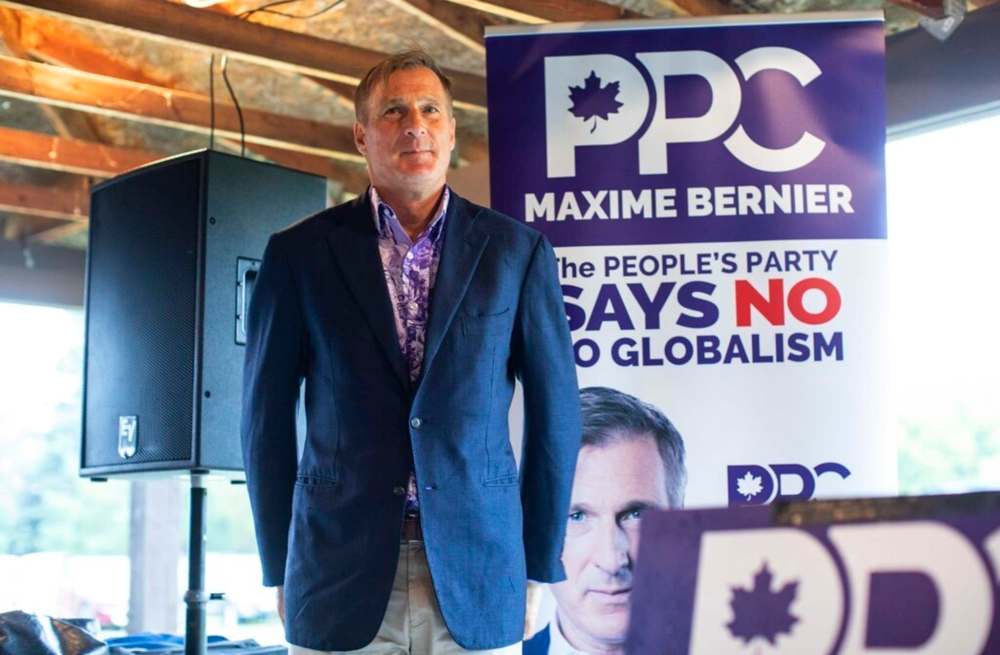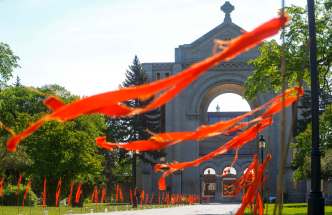People’s Party prep to play role of spoiler
Read this article for free:
or
Already have an account? Log in here »
To continue reading, please subscribe:
Monthly Digital Subscription
$0 for the first 4 weeks*
- Enjoy unlimited reading on winnipegfreepress.com
- Read the E-Edition, our digital replica newspaper
- Access News Break, our award-winning app
- Play interactive puzzles
*No charge for 4 weeks then price increases to the regular rate of $19.00 plus GST every four weeks. Offer available to new and qualified returning subscribers only. Cancel any time.
Monthly Digital Subscription
$4.75/week*
- Enjoy unlimited reading on winnipegfreepress.com
- Read the E-Edition, our digital replica newspaper
- Access News Break, our award-winning app
- Play interactive puzzles
*Billed as $19 plus GST every four weeks. Cancel any time.
To continue reading, please subscribe:
Add Free Press access to your Brandon Sun subscription for only an additional
$1 for the first 4 weeks*
*Your next subscription payment will increase by $1.00 and you will be charged $16.99 plus GST for four weeks. After four weeks, your payment will increase to $23.99 plus GST every four weeks.
Read unlimited articles for free today:
or
Already have an account? Log in here »
Hey there, time traveller!
This article was published 13/09/2021 (1553 days ago), so information in it may no longer be current.
One million votes.
As hard as it may be to imagine, the People’s Party of Canada and its pernicious leader, Maxime Bernier, are poised to draw more than a million votes in the upcoming federal election and, in the process, play a major role in determining the outcome.
Most public opinion polls have the PPC somewhere between five and eight per cent support among decided voters. That is a remarkable result for a party that has, to date, provided little more than comic relief in the national political debate.
However, the PPC has become a safe haven for a broad coalition of Canadians angry about many things but united by their opposition to COVID-19 vaccines and vaccine mandates.
The PPC is currently drawing pre-election support comparable to what the Green party received in 2019, when it captured 6.5 per cent of total votes cast (1.189 million).
If the PPC were able to produce a result like that, it would undoubtedly change the course of the 2021 election.

Since it was reconstituted in 2003, the Conservative Party of Canada has been the only viable choice for the right-of-centre, even those that leaned towards the outer realms of small ‘c’ conservatism.
However, the collision between the election and the COVID-19 pandemic has amplified the PPC’s message, making it the party of choice for some of Canada’s most extreme right-wing political views.
The PPC, as it stands right now, is still resource-starved and operationally dysfunctional. Although it is running an impressive 311 candidates, it does not have the resources to compete with more established parties.
But it can disrupt them.
In the 2019 election, the PPC only drew 1.62 per cent of the popular vote, or 294,000 total votes. Even so, Conservative strategists conceded they lost between six and eight seats in Ontario alone from vote splitting with the PPC.
The collision between the election and the COVID-19 pandemic has amplified the PPC’s message, making it the party of choice for some of Canada’s most extreme right-wing political views.
If Bernier were to see his party win four times more votes in this election, there is little doubt it would significantly hamper Conservative Leader Erin O’Toole’s plans to topple Liberal Leader Justin Trudeau.
The PPC could definitely play a role in three provinces: Quebec, Ontario and British Columbia.
Three-way battles between the Liberals, Conservatives and Bloc Québécois could easily be disrupted by a strong PPC vote. The same goes for the Ontario battleground, particularly in the so-called 905 area code seats outside Toronto.
In B.C., the landscape is particularly crowded. In some coastal ridings, there are strong three-way battles between the Liberals, Tories and NDP. Despite its woeful, self-inflicted wounds, the Green party is a major force in some ridings.
Of course, the PPC will only draw enough votes to affect the outcome of the election if everyone who is pledging support to Bernier’s party right now actually shows up on election day Sept. 20. Recent history suggests that may not happen.
In the lead-up to the 2019 election, the PPC polled between two and five per cent of decided voters. On election day, however, many of those PPC-friendly voters either did not vote or chose to support candidates from other parties.
It should be noted in 2019, the PPC did not have a central issue to galvanize support.
Bernier was able to draw votes from the Conservative base upset about his defeat in the 2017 leadership vote. But for the most part, he was seen as a bit of an oddball.
In the years since, Bernier has crept ever further out into the fringes of conservative politics. His rants about immigration, “ethnic division” and “extreme multiculturalism” were thinly veiled xenophobic dog whistles. Freed from the shackles of a party structure, he has continued a slow but steady march toward the ugly outer limits of national political debate.
Then came the pandemic, COVID-19 vaccines and vaccine mandates to breathe life into a moribund party fixated on libertarian principles and a perverted interpretation of rights and freedoms.
For this to be a true breakthrough election, the PPC would have to win some seats. Right now, that seems unlikely.
Vote splitting is a reality of modern politics and affects all parties to some extent. But in this instance, this party doesn’t have to actually win a seat to make its mark.
All Bernier and his followers need to do is deliver a healthy dose of mischief in a few strategically important seats, and they will have cemented their place in political history.
dan.lett@freepress.mb.ca

Born and raised in and around Toronto, Dan Lett came to Winnipeg in 1986, less than a year out of journalism school with a lifelong dream to be a newspaper reporter.
Our newsroom depends on a growing audience of readers to power our journalism. If you are not a paid reader, please consider becoming a subscriber.
Our newsroom depends on its audience of readers to power our journalism. Thank you for your support.






